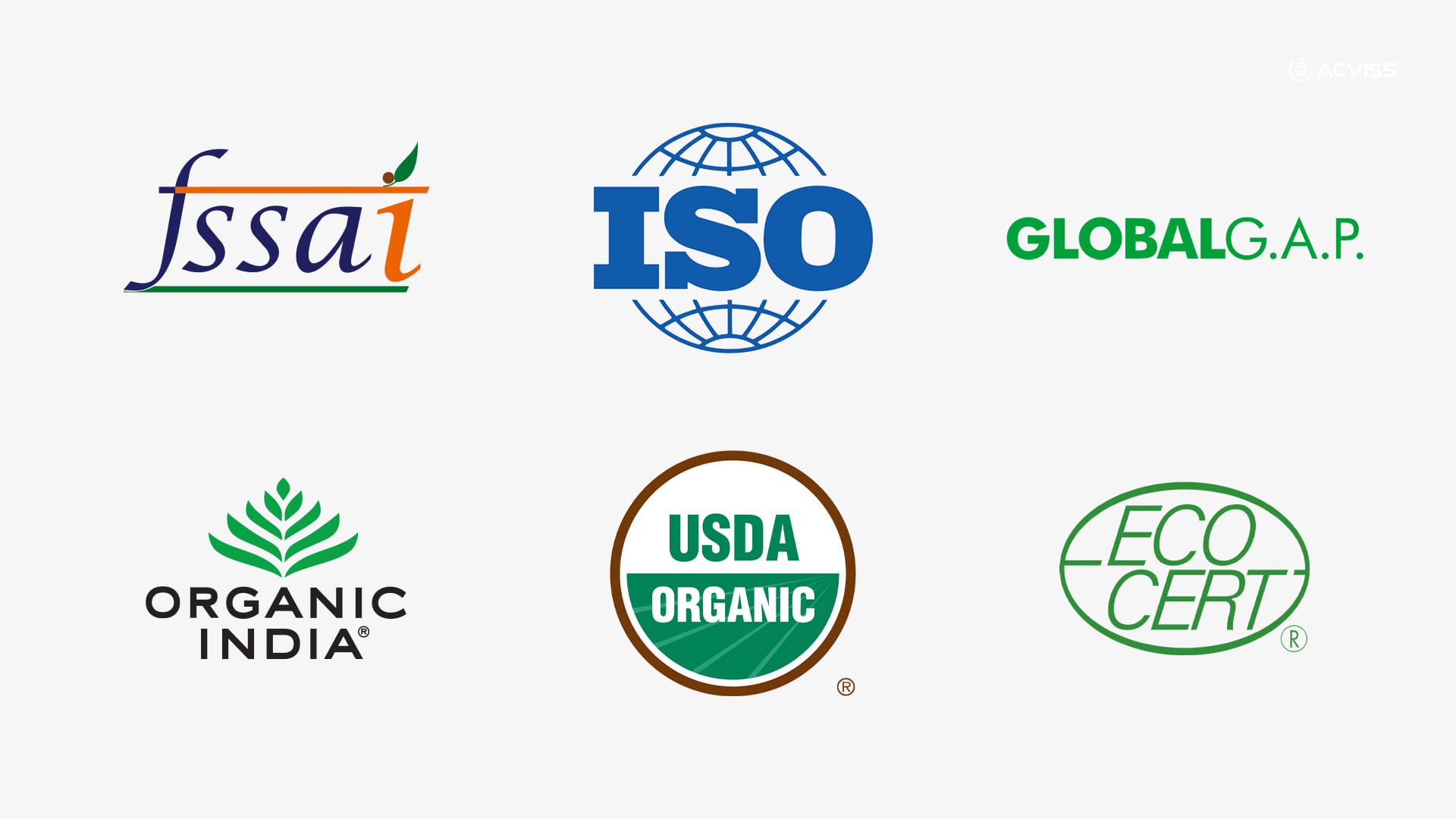A Buyer’s Guide to Choose the Right Agro Products Manufacturer in India

India is one of the world’s largest producers of agricultural goods, and its agro-manufacturers play a critical role in delivering high-quality products to both domestic and international markets. For buyers—whether distributors, retailers, or wholesalers—choosing the right agro-product manufacturer is crucial for ensuring quality, compliance, and smooth supply chain operations. This practical guide highlights key factors to consider when selecting a reliable agro-products manufacturer in India.
Choosing the Right Agro Product Manufacturer in India
1. Evaluate Certifications and Compliance Standards

When sourcing agro products, one of the first things to check is whether the manufacturer holds essential certifications that demonstrate their commitment to quality and safety. Certifications ensure that the manufacturer complies with both national and international agricultural standards.
- FSSAI (Food Safety and Standards Authority of India): This certification is a must for any manufacturer producing food and agro products for the Indian market. It ensures that the products meet hygiene and safety regulations.
- ISO Certification: Manufacturers that hold ISO 9001 or ISO 22000 certification have implemented strict quality management systems. ISO 22000, in particular, relates to food safety and is crucial for agro manufacturers.
- GlobalG.A.P.: For companies exporting agro products to global markets, GlobalG.A.P. certification is critical. It ensures that the products meet international standards for food safety, sustainability, and environmental protection.
- Organic Certification: If you are sourcing organic products, ensure the manufacturer is certified by recognized bodies like India Organic, USDA Organic, or ECOCERT.
Tip: Use digital certification tools like Acviss Certify to verify the authenticity of product certifications, helping you avoid counterfeit claims.
2. Check for Robust Quality Control Measures
Quality control is essential to ensuring that the agro products meet your standards consistently. A reliable manufacturer will have strict protocols in place for testing and quality assurance throughout the production process.
- Raw Material Sourcing: Ensure that the manufacturer sources their raw materials from reputable suppliers. A focus on traceability from farm to factory is a good indicator of quality control.
- In-House Testing: Check if the manufacturer has in-house laboratories for testing product quality, such as checking for pesticide residues, moisture content, or nutrient levels.
- Third-Party Audits: Independent audits by third-party agencies ensure that the manufacturer’s quality control processes meet industry standards. Look for manufacturers who undergo regular third-party inspections.
Tip: Ask for product samples and reports from recent quality audits to evaluate their consistency and commitment to high standards.
3. Assess the Manufacturer’s Distribution Network

A manufacturer’s distribution network is critical for ensuring timely and efficient delivery of products, especially if you’re sourcing agro products in bulk. A strong network will also help you scale up your operations without disruptions.
- National and International Reach: Determine whether the manufacturer has a well-established distribution network that can cater to your market, whether it’s domestic or global.
- Cold Chain Logistics: For perishable agro products, a manufacturer with a reliable cold chain logistics setup is essential to ensure that products are stored and transported under optimal conditions.
- Technology Integration: Manufacturers who use technology such as track-and-trace systems like Acviss Origin to monitor product movement through the supply chain offer added transparency. These systems allow you to track your orders in real time, ensuring timely delivery and reduced losses.
Tip: Verify the manufacturer’s distribution capabilities by reviewing their delivery timelines, existing client base, and supply chain technology.
4. Evaluate Pricing and Payment Flexibility
Price is always an important consideration, but it’s crucial to strike the right balance between cost and quality. Avoid manufacturers offering significantly lower prices than competitors, as this may indicate compromised product quality.
- Competitive Pricing: Compare prices across several manufacturers, but focus on those that provide high-quality products at reasonable rates. Avoid choosing a manufacturer solely based on the lowest price.
- Payment Terms: Check if the manufacturer offers flexible payment options, such as credit terms, especially if you plan to enter a long-term contract. Some manufacturers may offer discounts for bulk purchases or long-term partnerships.
Tip: Negotiate for payment terms that align with your business needs, but prioritize quality and reliability over cost savings.
5. Assess Reputation and Experience in the Market
A manufacturer’s reputation is often a strong indicator of its reliability. Established manufacturers with a long-standing history in the market are more likely to provide consistent product quality and meet your requirements.
- Years in Business: Look for manufacturers who have been in the industry for several years. A well-established company with a proven track record is more likely to deliver high-quality products and maintain compliance with industry standards.
- Customer Reviews and Testimonials: Check for feedback from other buyers, especially in your target market. Online reviews, testimonials, or case studies can provide insights into how well the manufacturer has served other clients.
- Successful Partnerships: Learn about the manufacturer’s existing partnerships. Companies that supply products to well-known brands or large distributors are likely to be more reliable.
Tip: Research the manufacturer’s market presence through trade fairs, exhibitions, and industry forums. Successful manufacturers often have a solid reputation within these circles.
6. Look for Sustainability Practices

With increasing demand for eco-friendly products, choosing a manufacturer that follows sustainable agricultural practices can give you a competitive edge. Sustainable practices not only reduce environmental impact but also improve the long-term quality of agro products.
- Organic Farming: Manufacturers who support organic farming or produce organic-certified products are ideal for buyers looking to cater to health-conscious or environmentally-conscious markets.
- Eco-Friendly Inputs: Look for manufacturers that use biofertilizers, biodegradable pesticides, or other sustainable farming inputs, which can enhance the environmental appeal of their products.
- Certifications for Sustainability: Certifications like Fairtrade or Rainforest Alliance are indicators that the manufacturer adheres to ethical and sustainable farming practices.
Tip: Partnering with a manufacturer that aligns with sustainability goals can help you cater to eco-conscious consumers and markets, especially in Europe and North America.
Successful Buyer-Manufacturer Partnerships
A wholesaler in the US looking for premium spices collaborated with a certified Indian spice manufacturer. Using Acviss Origin for real-time traceability of shipments, they were able to ensure timely deliveries and monitor product quality throughout the supply chain, resulting in a long-term partnership.
Must Read: How Indian Agro Product Manufacturers are Overcoming Their Challenges
The Right Choice
Selecting the right agro-products manufacturer in India requires careful evaluation of certifications, quality control measures, distribution networks, and pricing strategies. Partnering with a manufacturer that meets your specific needs—whether that’s organic certification, robust logistics, or sustainable practices—ensures long-term success in your sourcing strategy.
Leveraging digital solutions like Acviss Origin for tracking supply chains and certification verification, streamline the sourcing processes and build stronger, more transparent partnerships with manufacturers.
Remember, reliability, quality, and sustainability are key factors in choosing a manufacturer that will help you meet the demands of today’s competitive agricultural market.
